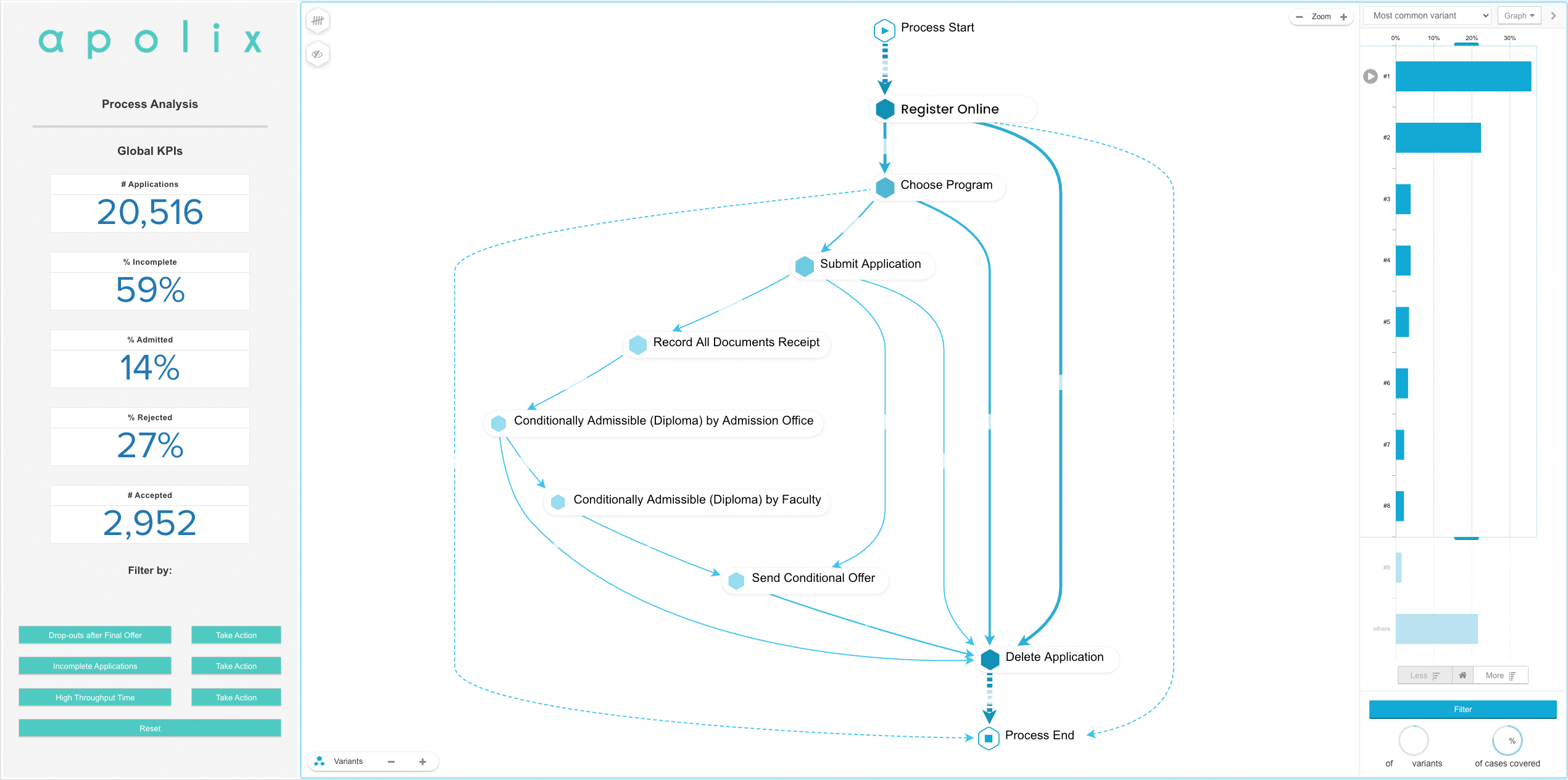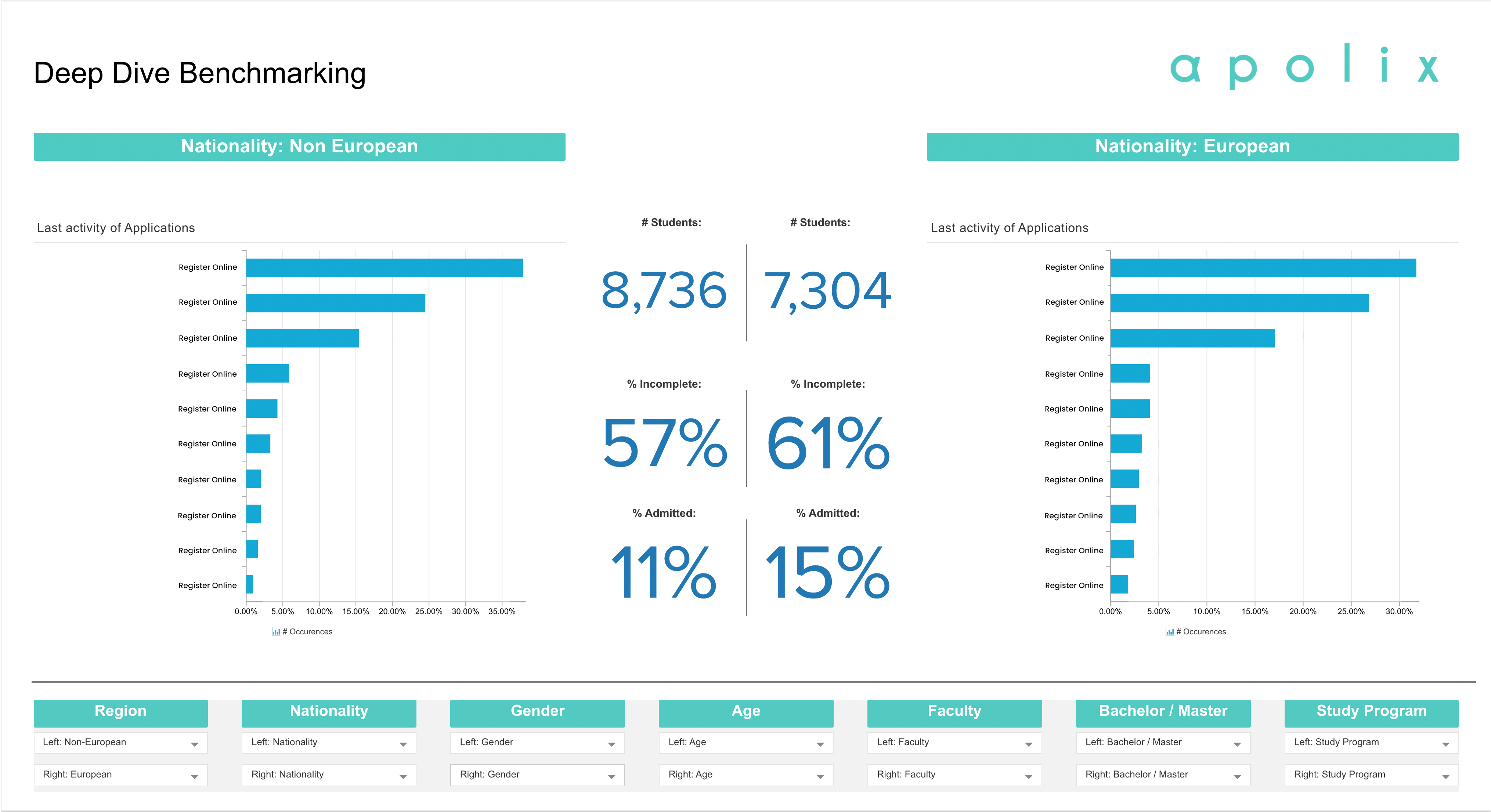Erasmus University Admission Process
The Erasmus University (EUR), located in Rotterdam, is committed to providing its students with a vibrant and entrepreneurial environment, where extracurricular activities are promoted and international top talents are attracted. To ensure the best customer journey for the application process, EUR collaborated with Apolix, one of their alumni’s start-ups, to discover the power of Process Mining. This project aims to optimise and reduce the drop-out rate of non-EEA students within the admissions process of one of the schools of Erasmus University. By using process mining, EUR can focus on optimising their admission process based on reality instead of design, thereby preventing the loss of talented students. Based on the attainable recommendations to close the gap between the groups, an extra annual revenue of more than 500,000€ can be realised within this school of the Erasmus University.

tags
date
26 Jan 2021The Erasmus University (EUR) is an internationally accredited research university based in the beautiful city of Rotterdam. At its heart the EUR puts the student experience above all, it offers students to interact with a vibrant and entrepreneurial environment. To create this climate, the EUR promotes extracurricular activities at the many student organisations and focuses to attract international top talents.
Since EUR admits students from all over the world, they want to ensure the best customer journey for their application process. For students outside of the European Economic Area (EEA) the admissions process is more complex due to regulations. Moreover, it is a challenge to understand the extra complexity where and why students drop out, and how individual students flow through the admission process.
Within the university, the ability to understand processes and improve student experience is part of their digitalisation strategy. The digitalisation of processes and capability towards a data driven organisation serves the solution for problems within the admissions process. In order to become data driven, the Erasmus University needs to understand where data is stored and how to translate this into valuable insights. Process Mining is the perfect fit to help build this understanding and create more enthusiasm for data-driven working.
Consequently, the EUR decided to collaborate with Apolix – one of their alumni’s start-ups -and discover the power of Process Mining. As the first step in the roadmap towards a data driven organisation, we took on the project to optimise and reduce the drop-out rate of non-EEA students within the admissions process of one of the schools of Erasmus University.
We make adjustments to the application process based on its design on a daily basis. However, with the insights process mining offers us we can more effectively tweak the process based on how it goes in reality!
– Eelke Menno de Jong, Head of Educational Information Systems @ Erasmus University
Admission Process Erasmus University
Like most faculties, the admission process of this particular school flows through the student information system Osiris. Furthermore, admissions of non-EEA students are quite complex since it flows through multiple departments: the International Office, Admissions Office and the faculty itself. At each stage of the process, the admission is reviewed for certain characteristics, such as completeness and the validity of diploma and grades.
As the first step to bring transparency to the admissions process, we started with managing the data by mapping the required data within Osiris. Although this is at the foundation of any Process Mining project, it strategically fits with the new strategy and turned out to add much value to the business intelligence centre of the EUR. We helped the university to gain a better understanding of their data structure and gain additional insights in the possibilities.
Based on the mapped process and its underlying data, we uncovered high complexity within the process. For the international studies, the process that is simple by design turns out to have a large number of variations. This explains why supporting students throughout their application process is very labour intensive for EUR employees. With the help of process mining, EUR now can focus on optimising their admission process based on reality instead of design.

Process Flow Application Process – Numbers and activities are randomised for privacy reasons.
Lost revenue due to incomplete applications
The goal of this Process Mining project is to prevent the loss of talented students. We defined lost talent as the students that have applied but cancelled their application before the EUR had the chance to either accept or decline them. This is the group of students the university might have wanted but did not complete the process. A part of this group are students who received an offer and cancelled the application afterwards. Each of those applicants made it through the selection and is a talent the university wants onboard; therefore, it is very valuable information to the EUR to identify this group.
Nevertheless, the main goal of this project is to minimise the incompletion rate of applications. To identify improvements, we compared the admission process of European group with the non-EEA students. Process Mining allows us to visualise and quantify the exact number of dropouts per process step. This enables us to see in what stages we lose the most applicants! By making the drop-out rate per process step visible and benchmarking the student groups, we identified large improvement opportunities to reduce the incompletion rate. In some cases, extra focus on the student experience leads to major improvements, such as adding translations to introduction videos. Moreover, the insights give a deep understanding to which steps in the application process can be simplified. The data driven way of working pinpointed with laser precision what to focus on, in order to reach the highest ROI.
Based on the handful of attainable recommendations to close the gap between the groups, an extra annual revenue of more than 500,000€ can be realised within this school of the Erasmus University.

Deep Dive Benchmark Analysis – Numbers and activities are randomised for privacy reasons.
Regarding the student experience, it is important to understand that Osiris and StudieLink are unknown software for someone outside of the Netherlands. Proactive reach outs and a tailored application procedure makes the applicants feel both welcome and supported in their decision to study abroad. The Action Engine of Celonis allows the recruiters of EUR to receive a notification when an applicant has not performed any activity for their application in more than two weeks. This way a recruiter of EUR can proactively reach out to an applicant to offer their help. Additionally, data shows and helps predict peak moments of applications. By anticipating to these times and allocating resources accordingly, data supports the university to help the greatest number of students with the available resources. All in order to give each student the best experience possible.
Without Apolix their process mining solution it would have been impossible to get a complete and objective overview of our application process. Process mining shows us exactly what needs to be done in order to improve our application process!
– Wilco te Winkel, CIO Office @ Erasmus University
Future steps
This project proofs the value data and Process Mining has to offer for Higher Education Institutes. By analysing an admissions process, many improvement opportunities arose to prevent the loss of international talent. Moreover, this process mining project inspired other faculties to discover the value their data has to offer. Together with Apolix, the Erasmus School of Law (ESL) starts a project to discover and analyse their student journey.
We are excited to support the ESL and the Erasmus University in their journey to become a data driven organisation!






